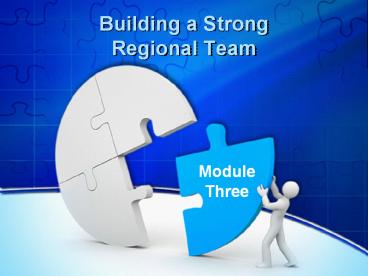Building a Strong Regional Team - PowerPoint PPT Presentation
1 / 33
Title:
Building a Strong Regional Team
Description:
Reflecting on the Previous Session. What was most useful from the previous modules? What progress has your group made since the previous session? – PowerPoint PPT presentation
Number of Views:95
Avg rating:3.0/5.0
Title: Building a Strong Regional Team
1
Building a StrongRegional Team
Module Three
2
Reflecting on the Previous Session
- What was most useful from the previous modules?
- What progress has your group made since the
previous session? - Any comments or questions about the previous
session?
3
In This Session We Will
- Consider the composition of effective regional
teams - Develop a call to action
- Examine small group development
- Explore successful regional collaborations
4
Green Light/Red Light
- Organizations to which you currently belong
- Organizations of which you once were a member
5
Why I Joined and Why I Left
- What Can We Learn?
How can we apply these lessons to our
partnership?
6
Building Your Team
7
A Strong Regional Team
- Prepares for obstacles
- Assesses group composition
- Engages more partners
- Promotes action
- Advocates
8
Who Is at Your Table?Who Else Should Be?
9
Who Else Should You Invite to Join?
Name of Team Member Major Sector/Interest Area the Person Represents
Example Joanne Smith Business (Banker)
Example Dr. Barbara Jones Education (Comm. College President)
10
Power and Interest
INTEREST
POWER
Source J.M. Bryson (2004)
11
Building Your Regional Team
INVITE INDIVIDUALS WHO
- Can influence the success of the strategy
- Have the skills necessary for implementation
- Have resources helpful to the group
- Are respected leaders of key sectors
- Will spread the message and encourage buy-in
- Represent emerging industry sectors
- Represent diverse populations
Source Know Your Region
12
Call to Action Basic Principles
- Communicate regional needs and challenges
- Describe purpose
- Provide reason for action
- Identify timeline
- Make sure plans are clear and understandable
Source Know Your Region
13
GROUP DEVELOPMENT
14
How Groups Often Form
15
Forming
- Testing the group out
- Looking for reactions
- Orienting to the task
- Determining the ground rules
- Depending on leaders
- Guarding hidden ideas and opinions
- Asking Why are we here?
16
Storming
- Conflict and polarization
- Group anxiety
- Lack of group unity
- Competition for position and power
- Resistance to group tasks
- Ineffective problem solving
17
Norming
- Trust forming cohesion builds
- Purpose becomes well defined
- Hidden agendas become open
- Group norms and ground rules established and
accepted - Team gains commitment from members on direction
and goals
18
Performing
- Group energy channeled
- Roles become flexible and functional
- Structural issues have been resolved
- Group becomes a problem solving instrument
- Differences safely aired and resolved
- Members take pleasure in the success of the team
- We replaces I - Trust high
- Goals accomplished
19
Is This Exactly How It Goes?
No. Group Formation Is Fluid.
20
BUILDING REGIONAL NETWORKS COLLABORATIVES
21
Collaboration Math
The whole is greater than the sum of the
parts.
22
What is Needed?
23
Benefits of Collaboration
- Shared resources
- Expanded perspectives
- Potential for greater positive results
- Increased number of relationships
24
Building Toward Collaboration
Trust
Effectiveness
Networking
25
Barriers to Collaboration
- Governmental or turf boundaries
- No big view of benefits
- Control trust issues
- Old rivalries
26
(No Transcript)
27
Building a Strong Regional Team
- Big initial success
- Small, but powerful group
- Attendance dropping
- Key leaders leaving
- Controversy over priorities and membership
28
- Challenge
- What changes should the collaborative make?
- How can the collaborative manage the concerns of
multiple groups? - What mistakes did the collaborative make?
29
Collaboration Expansion
- New organizations or individuals
- Potential barriers
- Potential benefits
3
30
Effective Regional LeadershipThe Seven Habits
- Be proactive
- Begin with the end in mind
- Seek first to understand, then to be understood
- Put first things first
- Think win-win, be inclusive
- Synergize
- Sharpen the saw
Source Council on Competitiveness (2010)
31
Final Reflections What are the takeaways from
our module?
- What topics did you find most helpful?
- What did you find confusing?
- What do you hope to implement as part of your
regional teams activities? - Other items you want to mention?
32
Looking Ahead . . .
- In Module Four, we will
- Review the important attributes of a good vision
statement - Develop/refine your teams vision statement
- Begin considering possible regional directions
33
Homework for Module Four































